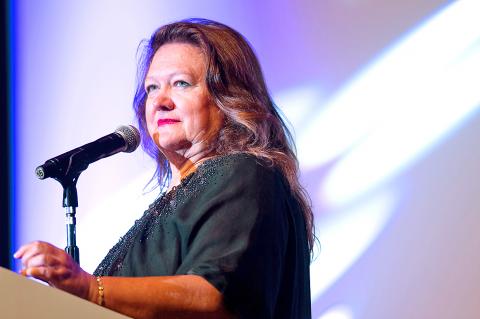Australia’s richest person, Gina Rinehart, was yesterday ordered by a court to relinquish control of a multi-billion dollar family trust to her eldest daughter, culminating a long and bitter feud.
The New South Wales Supreme Court appointed Bianca Rinehart as head of the trust, reportedly worth between A$4 billion and A$5 billion (US$3.1 billion and US$3.8 billion), which was established by her grandfather, mining magnate Lang Hancock.
“The court concluded that Bianca was better suited than any of the alternatives to administer this trust in the prevailing circumstances,” the judgement read.

Photo: Bloomberg
It ordered Gina Rinehart to deliver the trust documents and accounts to her daughter.
The family feud has been simmering since 2011, when three of Rinehart’s four children — son John and sisters Bianca and Hope — acted against their mother. Their other sister, Ginia, supported her.
At the center of the dispute was the lucrative trust set up by Lang Hancock in 1988 with his four grandchildren as the beneficiaries.
His daughter Gina was to run the fund, which holds a 24 percent share in her iron ore company Hancock Prospecting, until the youngest grandchild turned 25 in 2011.
However, just days before this date, Gina Rinehart allegedly moved to delay the payout until 2068, saying it would avoid a huge capital gains tax bill.
This prompted the siblings to take court action accusing her of misconduct, although Hope later withdrew from the case.
Justice Paul Brereton said in handing down the ruling that Rinehart had “gone to extraordinary lengths” to maintain control directly or indirectly of the trust.
However, he ruled that Bianca had demonstrated the ability to “robustly assert the rights of the trust.”
Gina Rinehart was this week ranked the 37th most powerful woman in the world by Forbes magazine with wealth of US$12.2 billion, down from US$17.4 billion last year due to a slumping iron ore price.

CAUTIOUS RECOVERY: While the manufacturing sector returned to growth amid the US-China trade truce, firms remain wary as uncertainty clouds the outlook, the CIER said The local manufacturing sector returned to expansion last month, as the official purchasing managers’ index (PMI) rose 2.1 points to 51.0, driven by a temporary easing in US-China trade tensions, the Chung-Hua Institution for Economic Research (CIER, 中華經濟研究院) said yesterday. The PMI gauges the health of the manufacturing industry, with readings above 50 indicating expansion and those below 50 signaling contraction. “Firms are not as pessimistic as they were in April, but they remain far from optimistic,” CIER president Lien Hsien-ming (連賢明) said at a news conference. The full impact of US tariff decisions is unlikely to become clear until later this month

GROWING CONCERN: Some senior Trump administration officials opposed the UAE expansion over fears that another TSMC project could jeopardize its US investment Taiwan Semiconductor Manufacturing Co (TSMC, 台積電) is evaluating building an advanced production facility in the United Arab Emirates (UAE) and has discussed the possibility with officials in US President Donald Trump’s administration, people familiar with the matter said, in a potentially major bet on the Middle East that would only come to fruition with Washington’s approval. The company has had multiple meetings in the past few months with US Special Envoy to the Middle East Steve Witkoff and officials from MGX, an influential investment vehicle overseen by the UAE president’s brother, the people said. The conversations are a continuation of talks that

CHIP DUTIES: TSMC said it voiced its concerns to Washington about tariffs, telling the US commerce department that it wants ‘fair treatment’ to protect its competitiveness Taiwan Semiconductor Manufacturing Co (TSMC, 台積電) yesterday reiterated robust business prospects for this year as strong artificial intelligence (AI) chip demand from Nvidia Corp and other customers would absorb the impacts of US tariffs. “The impact of tariffs would be indirect, as the custom tax is the importers’ responsibility, not the exporters,” TSMC chairman and chief executive officer C.C. Wei (魏哲家) said at the chipmaker’s annual shareholders’ meeting in Hsinchu City. TSMC’s business could be affected if people become reluctant to buy electronics due to inflated prices, Wei said. In addition, the chipmaker has voiced its concern to the US Department of Commerce

STILL LOADED: Last year’s richest person, Quanta Computer Inc chairman Barry Lam, dropped to second place despite an 8 percent increase in his wealth to US$12.6 billion Staff writer, with CNA Daniel Tsai (蔡明忠) and Richard Tsai (蔡明興), the brothers who run Fubon Group (富邦集團), topped the Forbes list of Taiwan’s 50 richest people this year, released on Wednesday in New York. The magazine said that a stronger New Taiwan dollar pushed the combined wealth of Taiwan’s 50 richest people up 13 percent, from US$174 billion to US$197 billion, with 36 of the people on the list seeing their wealth increase. That came as Taiwan’s economy grew 4.6 percent last year, its fastest pace in three years, driven by the strong performance of the semiconductor industry, the magazine said. The Tsai